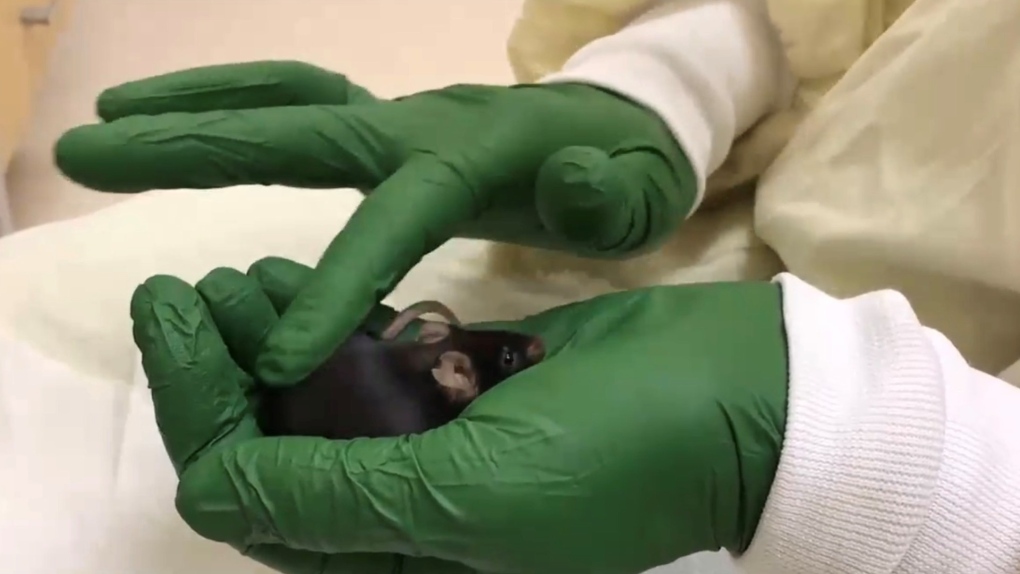U of L researchers exploring if touch could slow dementia’s onset
 The study involved mice specifically bred to develop Alzheimer's.
The study involved mice specifically bred to develop Alzheimer's.
A new study looking at the impact tactile stimulation, such as massaging and touching, is having on mice has researchers at the University of Lethbridge hoping one day it'll help those living with Alzheimer's disease.
"If you imagine that you fall and scrape your hand and what do you do? You rub your hand. And why do you do that? Because it feels better. And why does it feel better? Well, obviously, something is going on in your head that is affecting your brain," said Dr. Bryan Kolb, a neuroscientist at the U of L.
"So, the idea is maybe we can use tactile stimulation as a way of modifying brain activity."
The study involved mice specifically bred to develop Alzheimer's.
The mice either received tactile stimulation daily from birth until weaning (21 days) or, in a separate study, they received TS for 15 days beginning at four months of age.
Control mice received no tactile stimulation.
"By doing that three times a day, we were able to influence the onset of dementia – that is we slowed it down – in fact, we seemed to have blocked it altogether in these animals," Kolb explained.
At five and a half months of age, the experimenters used a series of tests to assess whether tactile stimulation had led to improvements in cognition, motor skills and anxiety behaviours and, at six months of age, the degree of plaque formation and hippocampal volume.
Plaque formation in these mice normally begins around three months of age and by six months, the plaque formation in the brain is saturated and is associated with large deficits in cognition, anxiety and motor skills.
The study is also looking to increase knowledge about what happens in the brain with Alzheimer’s and find more therapeutic treatments.
Around 60,000 Albertans live with dementia and the Alzheimer Society is thrilled to see the new study unfolding.
"Touch is one of the first senses we gain in the womb and it's one of the last senses we lose at the end of life," said Colleen Beck, navigator, client services with the Alzheimer Society.
"So, to hear the university is taking on sensory stimulation is so important."
Beck says ongoing research at the U of L and across the country is vital, as the disease can impact so many.
"It's not about when you lose your keys for the car because we all do that – we all misplace them,” Beck said. “A time to be concerned is when we get in the car and we don't understand the car. It's foreign to us – we don't know how to start it.”
Although a cure for Alzheimer's has yet to be found, those working on the study hope to one day introduce it to humans.
CTVNews.ca Top Stories

More than 115 cases of eye damage reported in Ontario after solar eclipse
More than 115 people who viewed the solar eclipse in Ontario earlier this month experienced eye damage after the event, according to eye doctors in the province.
Toxic testing standoff: Family leaves house over air quality
A Sherwood Park family says their new house is uninhabitable. The McNaughton's say they were forced to leave the house after living there for only a week because contaminants inside made it difficult to breathe.
Decoy bear used to catch man who illegally killed a grizzly, B.C. conservation officers say
A man has been handed a lengthy hunting ban and fined thousands of dollars for illegally killing a grizzly bear, B.C. conservation officers say.
B.C. seeks ban on public drug use, dialing back decriminalization
The B.C. NDP has asked the federal government to recriminalize public drug use, marking a major shift in the province's approach to addressing the deadly overdose crisis.
OPP responds to apparent video of officer supporting anti-Trudeau government protestors
The Ontario Provincial Police (OPP) says it's investigating an interaction between a uniformed officer and anti-Trudeau government protestors after a video circulated on social media.
An emergency slide falls off a Delta Air Lines plane, forcing pilots to return to JFK in New York
An emergency slide fell off a Delta Air Lines jetliner shortly after takeoff Friday from New York, and pilots who felt a vibration in the plane circled back to land safely at JFK Airport.
Sophie Gregoire Trudeau on navigating post-political life, co-parenting and freedom
Sophie Gregoire Trudeau says there is 'still so much love' between her and Prime Minister Justin Trudeau, as they navigate their post-separation relationship co-parenting their three children.
Last letters of pioneering climber who died on Everest reveal dark side of mountaineering
George Mallory is renowned for being one of the first British mountaineers to attempt to scale the dizzying heights of Mount Everest during the 1920s. Nearly a century later, newly digitized letters shed light on Mallory’s hopes and fears about ascending Everest.
Loud boom in Hamilton caused by propane tank, police say
A loud explosion was heard across Hamilton on Friday after a propane tank was accidentally destroyed and detonated at a local scrap metal yard, police say.






























